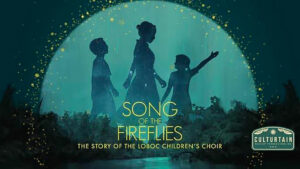By Brontë H. Lacsamana, Reporter
Movie Review
Song of the Fireflies
Directed by King Palisoc
EVERYONE loves a good underdog story, especially if it involves the overlooked and unconfident coming into their own after much perseverance. In this film, the underdogs are the children who grew up surrounded by the untamed bounty of nature, and a kind-hearted teacher keeping the musical activities of a provincial school afloat, deep in the island of Bohol.
The film tells the origin story of the world-renowned Loboc Children’s Choir (LCC) of Bohol. It is charming and inspiring. Scenes that show the kids’ angelic choral singing, which elevated them to stardom, paired with the serene landscapes of their home by the Loboc River, are enough to keep the average viewer entranced. Song of the Fireflies is a straightforward underdog tale in this beautiful setting, but it is also grounded by the cutthroat, competitive realities that often wear down those who aspire to succeed in the big city.
The film, starring Morrissette Amon, Rachel Alejandro, Krystal Brimner, and Noel Comia, Jr., takes place in the 1980s, when the real-life LCC and its teachers and benefactors began their whirlwind ascent.
Pong Ignacio’s relaxed and picturesque cinematography and the warm and familiar compositions by Ryan Cayabyab, Louie Ocampo, Raymond Marasigan, and Jazz Nicolas (the film’s musical direction is by Krina Cayabyab) gain easy praise. Many will likely look for the original film soundtrack that producers have said will be released soon. But it is writer Sarge Lacuesta and director Mr. Palisoc’s depiction of what it means to rise from provincial comforts to city-centric acclaim and scrutiny that make this film a worthwhile experience.
The aspects of the story tackling that friction make it more exciting than the typical biopic-style formula (which this film has). One scene showing the kids’ first ride through Manila in the form of frenetically edited archival footage and reels from the 1980s is particularly memorable. Certain character dynamics exploring this are just very briefly touched upon, though.
LCC’s steadfast founder and schoolteacher Alma Taldo (played by Ms. Amon in her first major role coming from an illustrious career as a singer) is portrayed with quiet passion. However, her arc of learning to stand strong amid internationally trained choirmasters and success-minded city dwellers requires more grit and nuance than Ms. Amon is able to give. Her singing is a definite strength, with one song where she comforts a student by the poolside being the capstone of her performance.
LCC’s primary patron and generous Boholano governor’s wife Equit Butalid (played by Ms. Alejandro with class and grace) has an intriguing depiction. As a gracious benefactor of the choir, her role is significant but has a sinister undertone of pride and greed as she pushes Alma and the children to win no matter what and she seemingly takes credit for what is mainly their hard work.
But the film inconsistently makes it a big deal in some parts, then glosses over it all in others, making the touches of this complex relationship between Alma and Equit incongruent with the rest of the story’s formula. It would have been a very different film if this was properly explored.
All that aside, Ms. Amon and Ms. Alejandro have a wonderful duet on the piano that may be the most outstanding musical number of the film, aside from the choral pieces.
Ms. Brimner and Mr. Comia, as the teenage choir members we follow the most (being the ones who strike up a potential romance, of course), deliver endearing performances. The former has such a beautiful voice, evidence of her years as a theater actress. The latter’s character arc — an insecure provincial boy seeking out his father in Manila that supposedly abandoned him — is a touching thread in the story that may seem out of place, but which ties together with the rest of the film’s ode to underdogs.
Notably, the other children in the choir are played by actual members of today’s iteration of LCC, injecting natural charm into the film. While it would have been fun to see a straight-up origin story, beginning from the very first attempt to form the group, picking up at the choir’s reformation and second attempt to win the finals was a choice that was best for the kind of story the filmmakers wanted to tell.
The film’s producers from Culturtain said at an advance screening that premiering the film at the Manila International Film Festival (MIFF) in the USA, and not in the Philippines, will likely work in its favor, with many Fil-Ams eager to watch a musical movie about overcoming adversity and rising up in a vibrant, unfamiliar land. With the current wildfires in California having caused the festival to be postponed to a later date, it is probably very fitting for residents of the area to see a film that offers hope.
The journey of the choir from rural comforts to dominating the National Finals of the National Music Competitions for Young Artists (NAMCYA) in the 1980s is an inspiring one that deserves to be put on screen, and Song of the Fireflies is easily a necessary watch for those who can relate to that journey.

